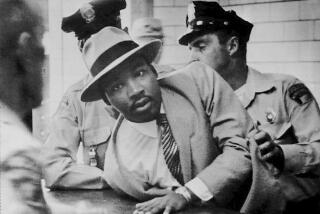Fountain Valley Author Takes on New Testament
- Share via
FOUNTAIN VALLEY — Robert Eisenman sometimes feels as if he’s being persecuted.
He’s been vilified by the New York Times as “incoherent” and “impossible.” Publications worldwide have taken shots at his latest book. Fellow academics have distanced themselves.
“He represents a marginal position,” said Mike Phelps, director of the Ancient Biblical Manuscript Center in Claremont.
James Sanders, a professor at the Claremont School of Theology, goes further. Eisenman’s ideas, he says, are “not even in left field; they are over the fence.”
At the center of the ruckus is “James, the Brother of Jesus,” the latest book by Eisenman, a professor of archeology and Middle Eastern religions at Cal State Long Beach and director of the university’s Center for the Study of Judeo Christian Origins.
In the book, Eisenman argues that James, called the brother of Jesus in the Bible, was Christ’s intended successor--an assertion contradicting the New Testament. Written later, mainly by the Apostle Paul and like-minded gospel authors, the New Testament depicts Jesus’ successor as Peter.
Eisenman says in his 1,094-page book that James the Just, as the early church called him, was a stronger, more forceful leader than Peter. While Peter is portrayed in the Bible as “attractive, pacifistic and accommodating,” says Eisenman, James, in addition to being an observant Jew, was a rebellious vegetarian who was “militant and apocalyptic.”
“It’s like comparing the ayatollah to the hippies,” Eisenman says of James and Peter.
If Eisenman’s assertions are true, they would radically alter the way modern-day Christians view the origins of their religion.
The New Testament, says Eisenman, “is one of the most successful rewrite enterprises in history.”
The maverick professor, who is Jewish and lives in Fountain Valley, is no stranger to controversy.
He made his first trip to Israel after graduating from Cornell University in 1958 with a bachelor’s degree in philosophy. After years spent studying the Dead Sea Scrolls--a collection of 2,000-year-old parchments found in caves near the Dead Sea that chronicles much of the background of Judaism and Christianity--Eisenman made international headlines in 1991 by playing a key role in persuading the Israeli government to release the texts to the public.
The following year, he published the world’s first complete translation of 50 key scroll fragments. His translations and commentary angered Christian traditionalists by suggesting that, in its early days, the religion was much closer to Judaism--more aggressive, more nationalistic, more messianic and far more militant--than biblical scholars had believed.
The new volume, published three months ago, is “my magnum opus,” Eisenman says.
Drawing from the Dead Sea Scrolls but based largely on the New Testament and old church texts, the book suggests a view of early Christianity radically at odds with the one most Christians hold today.
“If the rewriting of history that Eisenman wants to do is true,” says Edward Cook, an associate research scholar at Cincinnati’s Hebrew Union College, “then all of our knowledge about early Christianity up until now is false.”
If Christ’s intended successor was a nationalistic Jewish purist who fiercely opposed the rule of Rome, then what of the church’s historical standing encouraging its adherents to “turn the other cheek”? And what of Christianity’s view of itself as a natural outgrowth of Judaism that opened its arms to non-Jews?
One major point of contention has to do with the origins of anti-Semitism. While Eisenman maintains it stems from Paul’s politically motivated attacks on James’ Judaism, his critics attribute it to a broader cause.
“It’s too simplistic to say that [James] was Jewish and Paul was a scoundrel,” Sanders said. Instead, he theorizes, anti-Semitism stems from the early Jews’ propensity, while living in foreign lands, to refuse to bow down to the idols of their hosts. “They violated one of the laws of hospitality,” he said. “They were exclusive monotheists when everybody else in the world was polytheistic.”
The controversy has made Eisenman something of an international media celebrity. He has appeared on television and radio talk shows, as well as in university debates, in Houston, San Francisco, Washington, New York and London. He’s been the subject of articles in publications as diverse as the London Times and the Jerusalem Post.
Between appearances, the bespectacled professor can usually be found at his Fountain Valley home, where the book-lined living room is decorated with artifacts from his travels, from Moroccan fossils to ancient Palestinian coins. His upstairs study is strewn with stacks of his poetry.
Much of the James book was written in this room and on his family’s small sailboat in the Long Beach Marina.
Most of the book’s critics, Eisenman maintains, are people with their own agendas. “We’re threatening them,” he said. “They think we are attacking the religion they are trying to defend.”
Eisenman has received some support.
Cook, while disagreeing with much of his premise, described Eisenman as “a very imaginative and creative scholar.”
Keith Reeves, a professor of the New Testament at Azusa Pacific University, sees in Eisenman’s work a lesson for modern-day Christians.
“People have the idea that the early church was without conflict,” Reeves said, “but it’s clear that there was conflict even at the early stages regarding cultural and social differences.”
Those differences, according to Reeves, can be a source of strength rather than weakness.
“A tolerance for diversity,” he said, “would be something we could learn.”
More to Read
Sign up for our Book Club newsletter
Get the latest news, events and more from the Los Angeles Times Book Club, and help us get L.A. reading and talking.
You may occasionally receive promotional content from the Los Angeles Times.







